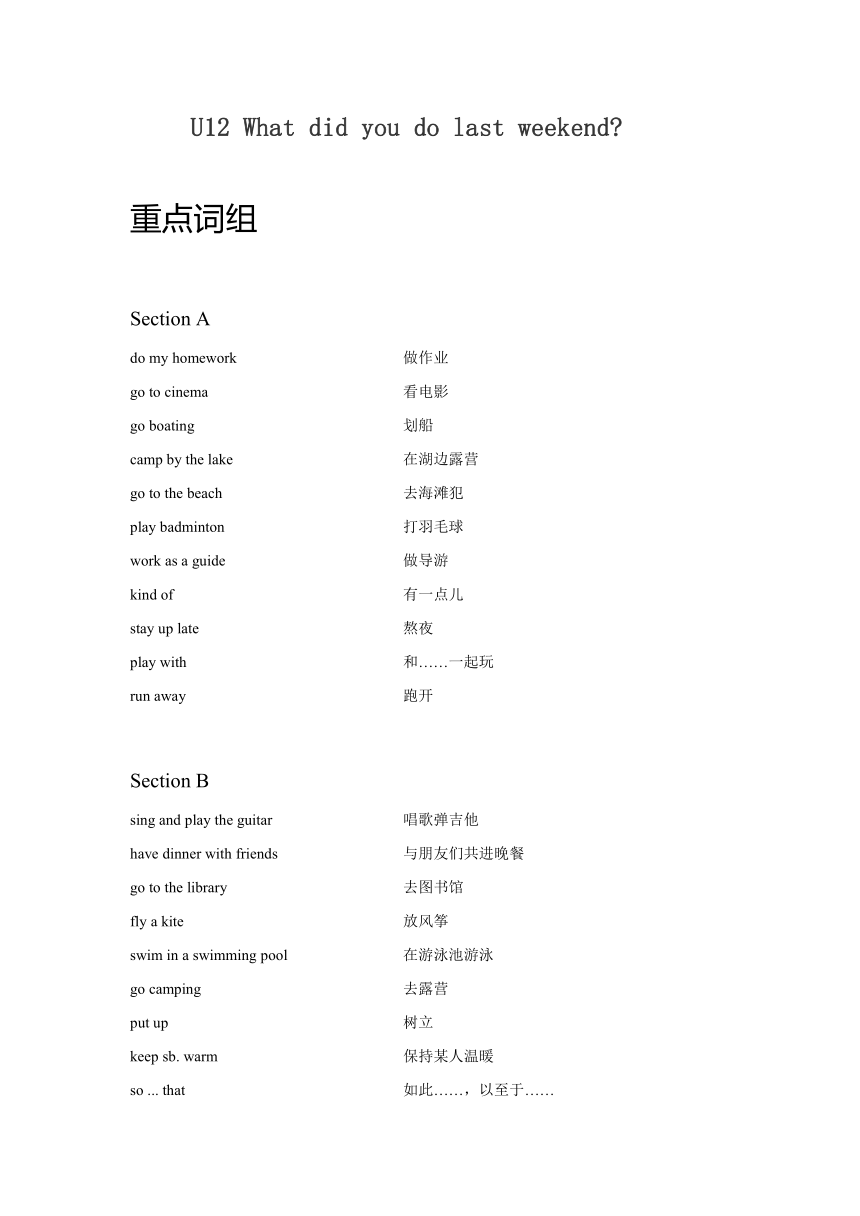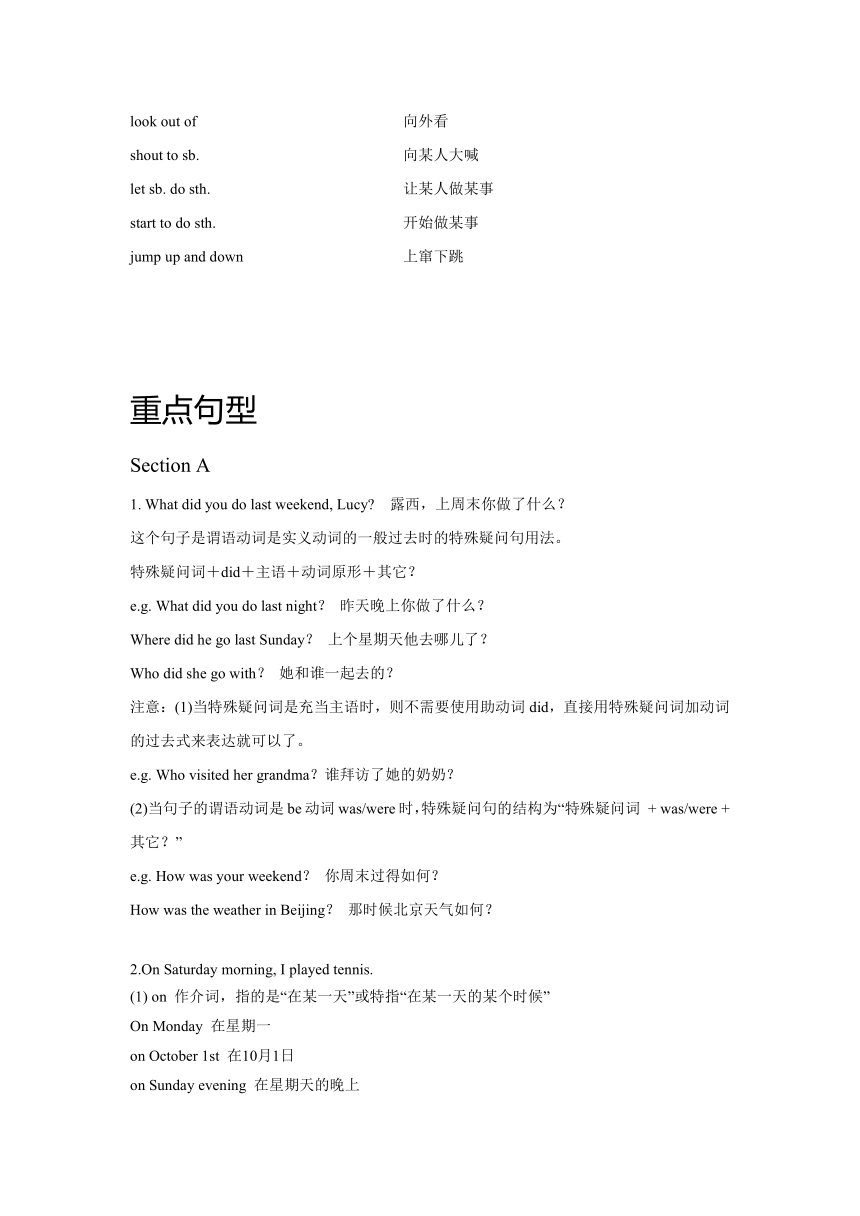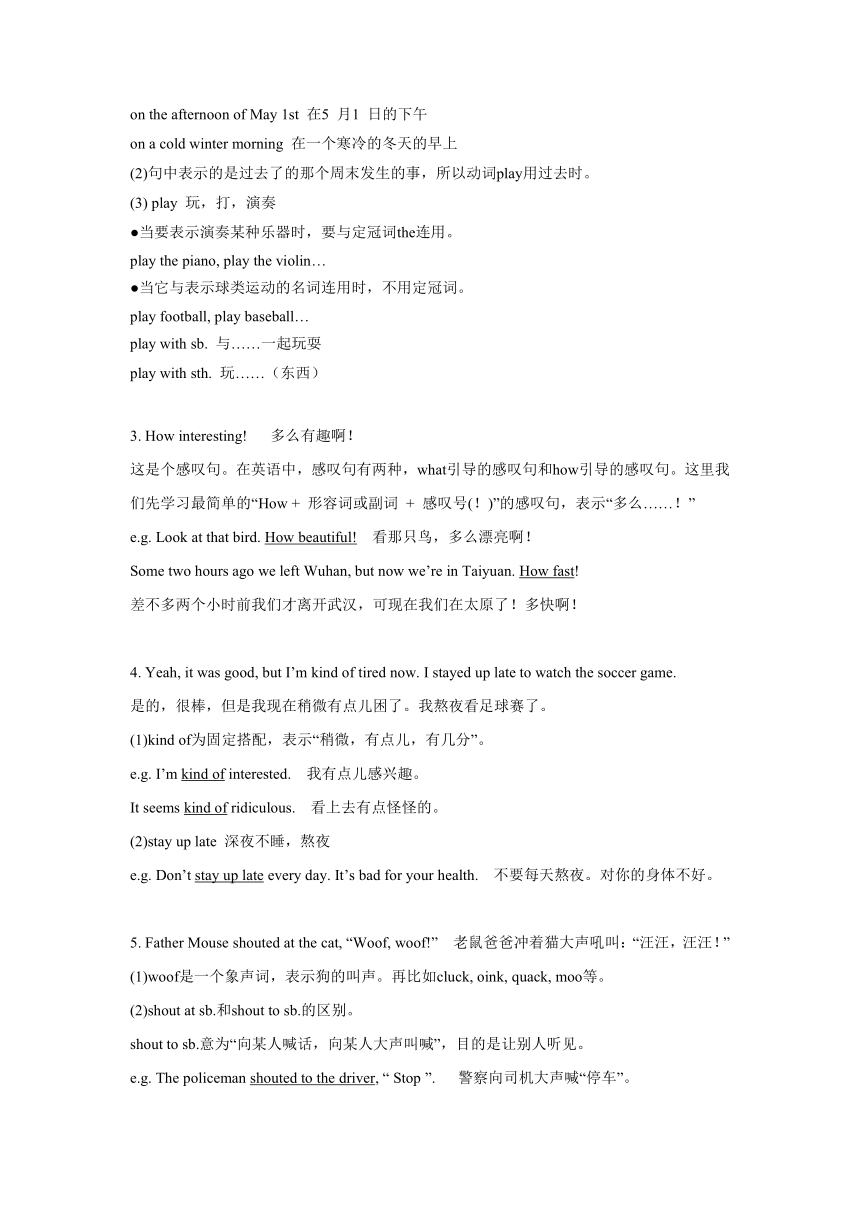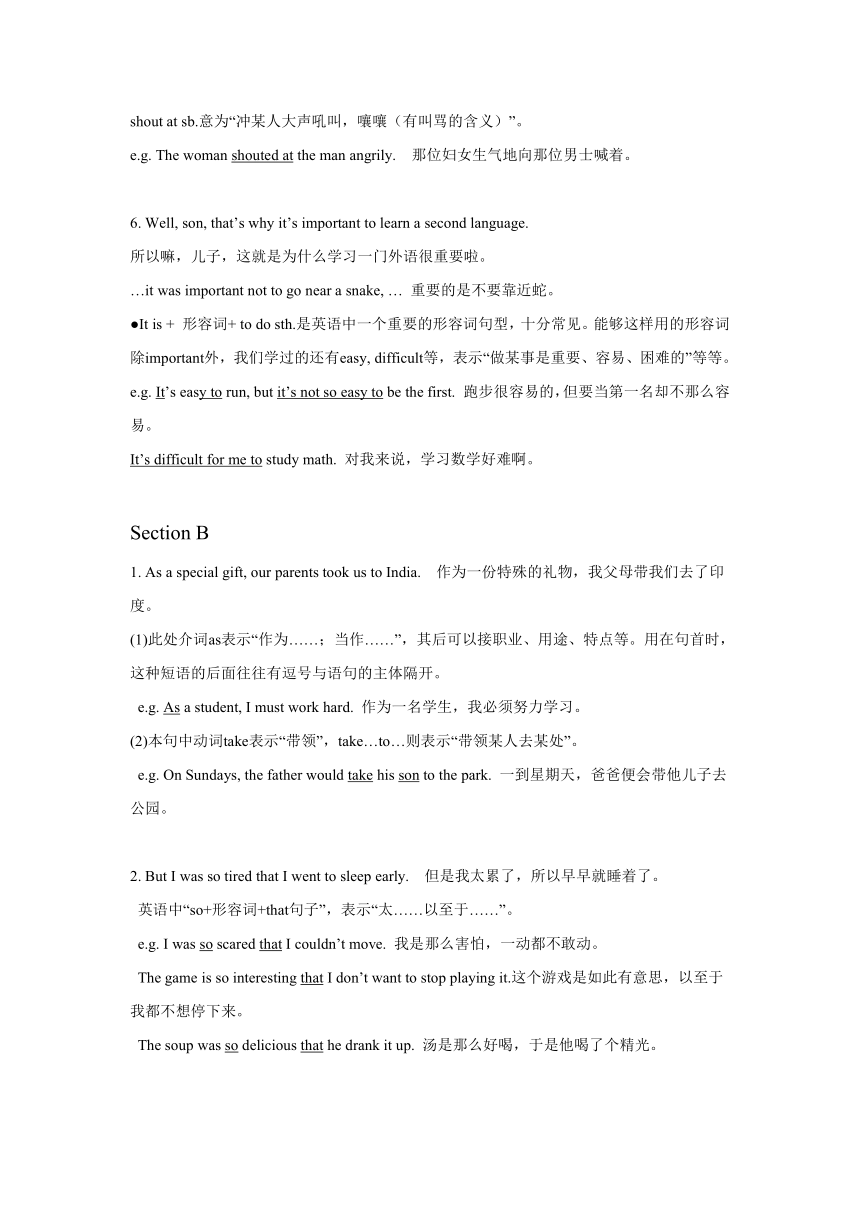人教版七年级英语下册 Unit 12 What did you do last weekend 重点词组+重点句型+重点语法+综合练习题
文档属性
| 名称 | 人教版七年级英语下册 Unit 12 What did you do last weekend 重点词组+重点句型+重点语法+综合练习题 |  | |
| 格式 | zip | ||
| 文件大小 | 21.9KB | ||
| 资源类型 | 教案 | ||
| 版本资源 | 人教新目标(Go for it)版 | ||
| 科目 | 英语 | ||
| 更新时间 | 2016-04-06 13:02:42 | ||
图片预览




文档简介
U12 What did you do last weekend
重点词组
Section A
do my homework 做作业
go to cinema 看电影
go boating 划船
camp by the lake 在湖边露营
go to the beach 去海滩犯
play badminton 打羽毛球
work as a guide 做导游
kind of 有一点儿
stay up late 熬夜
play with 和……一起玩
run away 跑开
Section B
sing and play the guitar 唱歌弹吉他
have dinner with friends 与朋友们共进晚餐
go to the library 去图书馆
fly a kite 放风筝
swim in a swimming pool 在游泳池游泳
go camping 去露营
put up 树立
keep sb. warm 保持某人温暖
so ... that 如此……,以至于……
look out of 向外看
shout to sb. 向某人大喊
let sb. do sth. 让某人做某事
start to do sth. 开始做某事
jump up and down 上窜下跳
重点句型
Section A
1. What did you do last weekend, Lucy 露西,上周末你做了什么?
这个句子是谓语动词是实义动词的一般过去时的特殊疑问句用法。
特殊疑问词+did+主语+动词原形+其它?
e.g. What did you do last night? 昨天晚上你做了什么?
Where did he go last Sunday? 上个星期天他去哪儿了?
Who did she go with? 她和谁一起去的?
注意:(1)当特殊疑问词是充当主语时,则不需要使用助动词did,直接用特殊疑问词加动词的过去式来表达就可以了。
e.g. Who visited her grandma?谁拜访了她的奶奶?
(2)当句子的谓语动词是be动词was/were时,特殊疑问句的结构为“特殊疑问词 + was/were +其它?”
e.g. How was your weekend? 你周末过得如何?
How was the weather in Beijing? 那时候北京天气如何?
2.On Saturday morning, I played tennis.
(1) on 作介词,指的是“在某一天”或特指“在某一天的某个时候”
On Monday 在星期一
on October 1st 在10月1日
on Sunday evening 在星期天的晚上
on the afternoon of May 1st 在5 月1 日的下午
on a cold winter morning 在一个寒冷的冬天的早上
(2)句中表示的是过去了的那个周末发生的事,所以动词play用过去时。
(3) play 玩,打,演奏
●当要表示演奏某种乐器时,要与定冠词the连用。
play the piano, play the violin…
●当它与表示球类运动的名词连用时,不用定冠词。
play football, play baseball…
play with sb. 与……一起玩耍
play with sth. 玩……(东西)
3. How interesting! 多么有趣啊!
这是个感叹句。在英语中,感叹句有两种,w ( http: / / www.21cnjy.com )hat引导的感叹句和how引导的感叹句。这里我们先学习最简单的“How + 形容词或副词 + 感叹号(!)”的感叹句,表示“多么……!”
e.g. Look at that bird. How beautiful! 看那只鸟,多么漂亮啊!
Some two hours ago we left Wuhan, but now we’re in Taiyuan. How fast!
差不多两个小时前我们才离开武汉,可现在我们在太原了!多快啊!
4. Yeah, it was good, ( http: / / www.21cnjy.com ) but I’m kind of tired now. I stayed up late to watch the soccer game.
是的,很棒,但是我现在稍微有点儿困了。我熬夜看足球赛了。
(1)kind of为固定搭配,表示“稍微,有点儿,有几分”。
e.g. I’m kind of interested. 我有点儿感兴趣。
It seems kind of ridiculous. 看上去有点怪怪的。
(2)stay up late 深夜不睡,熬夜
e.g. Don’t stay up late every day. It’s bad for your health. 不要每天熬夜。对你的身体不好。
5. Father Mouse shouted at the cat, “Woof, woof!” 老鼠爸爸冲着猫大声吼叫:“汪汪,汪汪!”
(1)woof是一个象声词,表示狗的叫声。再比如cluck, oink, quack, moo等。
(2)shout at sb.和shout to sb.的区别。
shout to sb.意为“向某人喊话,向某人大声叫喊”,目的是让别人听见。
e.g. The policeman shouted to the driver, “ Stop ”. 警察向司机大声喊“停车”。
shout at sb.意为“冲某人大声吼叫,嚷嚷(有叫骂的含义)”。
e.g. The woman shouted at the man angrily. 那位妇女生气地向那位男士喊着。
6. Well, son, that’s why it’s important to learn a second language.
所以嘛,儿子,这就是为什么学习一门外语很重要啦。
…it was important not to go near a snake, … 重要的是不要靠近蛇。
●It is + 形容词+ to do s ( http: / / www.21cnjy.com )th.是英语中一个重要的形容词句型,十分常见。能够这样用的形容词除important外,我们学过的还有easy, difficult等,表示“做某事是重要、容易、困难的”等等。
e.g. It’s eas ( http: / / www.21cnjy.com )y to run, but it’s not so easy to be the first. 跑步很容易的,但要当第一名却不那么容易。
It’s difficult for me to study math. 对我来说,学习数学好难啊。
Section B
1. As a special gif ( http: / / www.21cnjy.com )t, our parents took us to India. 作为一份特殊的礼物,我父母带我们去了印度。
(1)此处介词as表示“作为……;当作……”,其后可以接职业、用途、特点等。用在句首时,这种短语的后面往往有逗号与语句的主体隔开。
e.g. As a student, I must work hard. 作为一名学生,我必须努力学习。
(2)本句中动词take表示“带领”,take…to…则表示“带领某人去某处”。
e.g. On Sundays, ( http: / / www.21cnjy.com )the father would take his son to the park. 一到星期天,爸爸便会带他儿子去公园。
2. But I was so tired that I went to sleep early. 但是我太累了,所以早早就睡着了。
英语中“so+形容词+that句子”,表示“太……以至于……”。
e.g. I was so scared that I couldn’t move. 我是那么害怕,一动都不敢动。
The game is so in ( http: / / www.21cnjy.com )teresting that I don’t want to stop playing it.这个游戏是如此有意思,以至于我都不想停下来。
The soup was so delicious that he drank it up. 汤是那么好喝,于是他喝了个精光。
3.When we looked out o ( http: / / www.21cnjy.com )f our tent, we saw a big snake sleeping near the fire.
当我们向帐篷外面看去,我们发现一条大蛇正在篝火附近睡觉。
英语中表示感官的动词,比如see, hear, feel等动词后可以接动词的ing形式,表示“看见、听到、觉得某人或某物正在做某事”。
e.g. I can hear the children singing in the classroom. 我能听见孩子们在教室里唱歌。
I looked out ( http: / / www.21cnjy.com )the window and saw some boys playing soccer on the playground.
我往窗外望去,看见一些男孩子在操场上踢球。
My dad told me later that snakes don’t have ears but can feel things moving.
我爸爸后来告诉我说,蛇是没有耳朵的,但是它们能赶到东西的震动。
重点语法
一般过去时
动词过去式
过去式是用来表达动词的“过了”、“完了”,“结束了”等意思,和现在的状态没有关系。
一般过去式表示过去的动作和状态。I met him yesterday.
一般过去式构成:动词的过去式可分为规则动词和不规则动词。
规则动词的过去式变化如下:
◆一般情况下,动词词尾加-ed ,如:
worked played wanted acted
◆以不发音的-e 结尾动词,动词词尾加-d,如:
lived moved decided declined hoped raised wiped
◆以辅音字母+ y 结尾的动词,把-y 变为-i 再加-ed,如:
studied tried copied justified cried carried embodied emptied
◆ 以一个辅音字母结尾的重读闭音节动词,双写词尾辅音字母,再加-ed,如:
stop - stopp ( http: / / www.21cnjy.com )ed beg - begged drag - dragged drop - dropped plan – planned
注:不规则动词的过去式变化规律性不强,须多加记忆
如am, is-was, are-were, do-did, see-saw, say-said, give-gave, get-got, go-went, come-came, have-had, eat-ate, take-took, run-ran, sing-sang, put-put, fly-flew, make-made, read-read, write-wrote, draw-drew, drink-drank, ride-rode, speak-spoke, sweep-swept, swim-swam, sit-sat
2.一般过去时的基本用法
◆ 带有确定的过去时间状语时,要用过去 ( http: / / www.21cnjy.com )时yesterday/two days ago/last year/the other day/once up on a time/just now/in the old days/before liberation
When I was 8 years old
Did you have a party the other day
Lei Feng was a good soldier.
[注意] 在谈到已死去的人的情况时,多用过去时。
◆ 表示过去连续发生的动作时,要用过去时
◆ 这种情况下,往往没有表示过去的时间状语,而通过上下文来表示。
The boy opened his ( http: / / www.21cnjy.com )eyes for a moment,looked at the captain,and then died.
◆ 表示过去一段时间内经常或反复的动作常与always,never 等连用。
比较
Mrs. Peter always carries an umbrella. 彼得太太老是带着伞。
Mrs. Peter always carried an umbrella. 彼得太太过去老是带着一把伞。
◆ 如果强调已经终止的习惯时要用used to do
He used to drink. 他过去喝酒。
【比较】I used to take a walk in the morning. 我过去是在早晨散步。
I took a walk in the morning. 我曾经在早晨散过步。
◆ 有些句子,虽然没有表示过去确定时间的状语,但实际上是指过去发生的动作或存在的状态的话,也要用过去时。
I didn’t know you were in Paris.
I thought you were ill.
综合练习题
一、单选
1. I________ too late last night so I am quite tired now.
A.showed up B.called up C.set up D.stayed up
2. He________ go home unit he finished(完成) his work.
A.didn’t B.did C.doesn’t D.does
3. ---Were there many students there yesterday
---________ .
A.Yes, there was B.Yes, there were C.Yes, there is D.Yes, there are
4. He________ to the zoo yesterday.
A.go B.didn’t went C.didn’t go D.going
5. ---Where________ you go on vacation
---I went to the mountains.
A.do B.did C.are D.were
6. ---Did you go to Center Park
---________.
A.Yes, I did B.Yes, you did C.Yes, I didn’t D.No, I did
7. ________Sunday afternoon, we flew kites.
A.In B.At C.From D.On
8. I found a little boy ________ in the street at that time.
A.plays B.played C.play D.playing
9. Mr. Smith teache ( http: / / www.21cnjy.com )s ________ well ________his lessons are not easily forgotten.
A.very; that B.quite; but C.so; as D.so; that
10. It’s hard to ________ a job in the city now.
A.find B.finding C.found D.finds
11. He ________ his homework, he ________ to the library.
A. didn’t do, w ( http: / / www.21cnjy.com )ent B. didn’t did, goes C. didn’t do, go D. did not, went
12. I played soccer ________ my friends ________ Sunday afternoon.
A. with, in B. with, on C. and, on D. and, at
13. It was time for Old Henry ________.
A. go home B. went home C. to go home D. to go to home
14. He stayed at home, ________ he
A. did B. does C. doesn’t D. didn’t
15. For you, it’s useful to do more ________ .
A. read B. reads C. to read D. reading
16. ---Did you clean the room
---________.
A. Yes, I do B. No, I did C. Yes, I don’t D .No, I didn’t
17. When________your brother born
A. was B. is C. were D. are
18. Is that ________ interesting novel Yes, but it is ________ difficult.
A. an, a little B. a, a bit C. a, little D. an, a few
19. ________ your sister ________ the vacation
A. How do, spend B. How did, spend C. What do, spent D. How does, spent
20. His father ________ in Beijing now. Last year he ________ in Dalian.
A. worked, working ( http: / / www.21cnjy.com ) B. works , working C. is working, worked D. is working ,works
二、完成句子
1. 在假期期间你做了什么
What ___________ you do ___________ vacation
2. 他们周六晚上开了个晚会.
They ___________a party___________ Saturday evening.
3. 你的周末过得怎么样
___________ ___________ your weekend
4. 昨晚我没有看电视.
I ___________ ___________ TV last night.
5. 我们每天练习说英语.
We ___________ ___________ English every day.
6. 在星期六上午.我打网球并打扫房间.
___________ Saturday ( http: / / www.21cnjy.com ) morning , I ___________ tennis and cleaned my room.
重点词组
Section A
do my homework 做作业
go to cinema 看电影
go boating 划船
camp by the lake 在湖边露营
go to the beach 去海滩犯
play badminton 打羽毛球
work as a guide 做导游
kind of 有一点儿
stay up late 熬夜
play with 和……一起玩
run away 跑开
Section B
sing and play the guitar 唱歌弹吉他
have dinner with friends 与朋友们共进晚餐
go to the library 去图书馆
fly a kite 放风筝
swim in a swimming pool 在游泳池游泳
go camping 去露营
put up 树立
keep sb. warm 保持某人温暖
so ... that 如此……,以至于……
look out of 向外看
shout to sb. 向某人大喊
let sb. do sth. 让某人做某事
start to do sth. 开始做某事
jump up and down 上窜下跳
重点句型
Section A
1. What did you do last weekend, Lucy 露西,上周末你做了什么?
这个句子是谓语动词是实义动词的一般过去时的特殊疑问句用法。
特殊疑问词+did+主语+动词原形+其它?
e.g. What did you do last night? 昨天晚上你做了什么?
Where did he go last Sunday? 上个星期天他去哪儿了?
Who did she go with? 她和谁一起去的?
注意:(1)当特殊疑问词是充当主语时,则不需要使用助动词did,直接用特殊疑问词加动词的过去式来表达就可以了。
e.g. Who visited her grandma?谁拜访了她的奶奶?
(2)当句子的谓语动词是be动词was/were时,特殊疑问句的结构为“特殊疑问词 + was/were +其它?”
e.g. How was your weekend? 你周末过得如何?
How was the weather in Beijing? 那时候北京天气如何?
2.On Saturday morning, I played tennis.
(1) on 作介词,指的是“在某一天”或特指“在某一天的某个时候”
On Monday 在星期一
on October 1st 在10月1日
on Sunday evening 在星期天的晚上
on the afternoon of May 1st 在5 月1 日的下午
on a cold winter morning 在一个寒冷的冬天的早上
(2)句中表示的是过去了的那个周末发生的事,所以动词play用过去时。
(3) play 玩,打,演奏
●当要表示演奏某种乐器时,要与定冠词the连用。
play the piano, play the violin…
●当它与表示球类运动的名词连用时,不用定冠词。
play football, play baseball…
play with sb. 与……一起玩耍
play with sth. 玩……(东西)
3. How interesting! 多么有趣啊!
这是个感叹句。在英语中,感叹句有两种,w ( http: / / www.21cnjy.com )hat引导的感叹句和how引导的感叹句。这里我们先学习最简单的“How + 形容词或副词 + 感叹号(!)”的感叹句,表示“多么……!”
e.g. Look at that bird. How beautiful! 看那只鸟,多么漂亮啊!
Some two hours ago we left Wuhan, but now we’re in Taiyuan. How fast!
差不多两个小时前我们才离开武汉,可现在我们在太原了!多快啊!
4. Yeah, it was good, ( http: / / www.21cnjy.com ) but I’m kind of tired now. I stayed up late to watch the soccer game.
是的,很棒,但是我现在稍微有点儿困了。我熬夜看足球赛了。
(1)kind of为固定搭配,表示“稍微,有点儿,有几分”。
e.g. I’m kind of interested. 我有点儿感兴趣。
It seems kind of ridiculous. 看上去有点怪怪的。
(2)stay up late 深夜不睡,熬夜
e.g. Don’t stay up late every day. It’s bad for your health. 不要每天熬夜。对你的身体不好。
5. Father Mouse shouted at the cat, “Woof, woof!” 老鼠爸爸冲着猫大声吼叫:“汪汪,汪汪!”
(1)woof是一个象声词,表示狗的叫声。再比如cluck, oink, quack, moo等。
(2)shout at sb.和shout to sb.的区别。
shout to sb.意为“向某人喊话,向某人大声叫喊”,目的是让别人听见。
e.g. The policeman shouted to the driver, “ Stop ”. 警察向司机大声喊“停车”。
shout at sb.意为“冲某人大声吼叫,嚷嚷(有叫骂的含义)”。
e.g. The woman shouted at the man angrily. 那位妇女生气地向那位男士喊着。
6. Well, son, that’s why it’s important to learn a second language.
所以嘛,儿子,这就是为什么学习一门外语很重要啦。
…it was important not to go near a snake, … 重要的是不要靠近蛇。
●It is + 形容词+ to do s ( http: / / www.21cnjy.com )th.是英语中一个重要的形容词句型,十分常见。能够这样用的形容词除important外,我们学过的还有easy, difficult等,表示“做某事是重要、容易、困难的”等等。
e.g. It’s eas ( http: / / www.21cnjy.com )y to run, but it’s not so easy to be the first. 跑步很容易的,但要当第一名却不那么容易。
It’s difficult for me to study math. 对我来说,学习数学好难啊。
Section B
1. As a special gif ( http: / / www.21cnjy.com )t, our parents took us to India. 作为一份特殊的礼物,我父母带我们去了印度。
(1)此处介词as表示“作为……;当作……”,其后可以接职业、用途、特点等。用在句首时,这种短语的后面往往有逗号与语句的主体隔开。
e.g. As a student, I must work hard. 作为一名学生,我必须努力学习。
(2)本句中动词take表示“带领”,take…to…则表示“带领某人去某处”。
e.g. On Sundays, ( http: / / www.21cnjy.com )the father would take his son to the park. 一到星期天,爸爸便会带他儿子去公园。
2. But I was so tired that I went to sleep early. 但是我太累了,所以早早就睡着了。
英语中“so+形容词+that句子”,表示“太……以至于……”。
e.g. I was so scared that I couldn’t move. 我是那么害怕,一动都不敢动。
The game is so in ( http: / / www.21cnjy.com )teresting that I don’t want to stop playing it.这个游戏是如此有意思,以至于我都不想停下来。
The soup was so delicious that he drank it up. 汤是那么好喝,于是他喝了个精光。
3.When we looked out o ( http: / / www.21cnjy.com )f our tent, we saw a big snake sleeping near the fire.
当我们向帐篷外面看去,我们发现一条大蛇正在篝火附近睡觉。
英语中表示感官的动词,比如see, hear, feel等动词后可以接动词的ing形式,表示“看见、听到、觉得某人或某物正在做某事”。
e.g. I can hear the children singing in the classroom. 我能听见孩子们在教室里唱歌。
I looked out ( http: / / www.21cnjy.com )the window and saw some boys playing soccer on the playground.
我往窗外望去,看见一些男孩子在操场上踢球。
My dad told me later that snakes don’t have ears but can feel things moving.
我爸爸后来告诉我说,蛇是没有耳朵的,但是它们能赶到东西的震动。
重点语法
一般过去时
动词过去式
过去式是用来表达动词的“过了”、“完了”,“结束了”等意思,和现在的状态没有关系。
一般过去式表示过去的动作和状态。I met him yesterday.
一般过去式构成:动词的过去式可分为规则动词和不规则动词。
规则动词的过去式变化如下:
◆一般情况下,动词词尾加-ed ,如:
worked played wanted acted
◆以不发音的-e 结尾动词,动词词尾加-d,如:
lived moved decided declined hoped raised wiped
◆以辅音字母+ y 结尾的动词,把-y 变为-i 再加-ed,如:
studied tried copied justified cried carried embodied emptied
◆ 以一个辅音字母结尾的重读闭音节动词,双写词尾辅音字母,再加-ed,如:
stop - stopp ( http: / / www.21cnjy.com )ed beg - begged drag - dragged drop - dropped plan – planned
注:不规则动词的过去式变化规律性不强,须多加记忆
如am, is-was, are-were, do-did, see-saw, say-said, give-gave, get-got, go-went, come-came, have-had, eat-ate, take-took, run-ran, sing-sang, put-put, fly-flew, make-made, read-read, write-wrote, draw-drew, drink-drank, ride-rode, speak-spoke, sweep-swept, swim-swam, sit-sat
2.一般过去时的基本用法
◆ 带有确定的过去时间状语时,要用过去 ( http: / / www.21cnjy.com )时yesterday/two days ago/last year/the other day/once up on a time/just now/in the old days/before liberation
When I was 8 years old
Did you have a party the other day
Lei Feng was a good soldier.
[注意] 在谈到已死去的人的情况时,多用过去时。
◆ 表示过去连续发生的动作时,要用过去时
◆ 这种情况下,往往没有表示过去的时间状语,而通过上下文来表示。
The boy opened his ( http: / / www.21cnjy.com )eyes for a moment,looked at the captain,and then died.
◆ 表示过去一段时间内经常或反复的动作常与always,never 等连用。
比较
Mrs. Peter always carries an umbrella. 彼得太太老是带着伞。
Mrs. Peter always carried an umbrella. 彼得太太过去老是带着一把伞。
◆ 如果强调已经终止的习惯时要用used to do
He used to drink. 他过去喝酒。
【比较】I used to take a walk in the morning. 我过去是在早晨散步。
I took a walk in the morning. 我曾经在早晨散过步。
◆ 有些句子,虽然没有表示过去确定时间的状语,但实际上是指过去发生的动作或存在的状态的话,也要用过去时。
I didn’t know you were in Paris.
I thought you were ill.
综合练习题
一、单选
1. I________ too late last night so I am quite tired now.
A.showed up B.called up C.set up D.stayed up
2. He________ go home unit he finished(完成) his work.
A.didn’t B.did C.doesn’t D.does
3. ---Were there many students there yesterday
---________ .
A.Yes, there was B.Yes, there were C.Yes, there is D.Yes, there are
4. He________ to the zoo yesterday.
A.go B.didn’t went C.didn’t go D.going
5. ---Where________ you go on vacation
---I went to the mountains.
A.do B.did C.are D.were
6. ---Did you go to Center Park
---________.
A.Yes, I did B.Yes, you did C.Yes, I didn’t D.No, I did
7. ________Sunday afternoon, we flew kites.
A.In B.At C.From D.On
8. I found a little boy ________ in the street at that time.
A.plays B.played C.play D.playing
9. Mr. Smith teache ( http: / / www.21cnjy.com )s ________ well ________his lessons are not easily forgotten.
A.very; that B.quite; but C.so; as D.so; that
10. It’s hard to ________ a job in the city now.
A.find B.finding C.found D.finds
11. He ________ his homework, he ________ to the library.
A. didn’t do, w ( http: / / www.21cnjy.com )ent B. didn’t did, goes C. didn’t do, go D. did not, went
12. I played soccer ________ my friends ________ Sunday afternoon.
A. with, in B. with, on C. and, on D. and, at
13. It was time for Old Henry ________.
A. go home B. went home C. to go home D. to go to home
14. He stayed at home, ________ he
A. did B. does C. doesn’t D. didn’t
15. For you, it’s useful to do more ________ .
A. read B. reads C. to read D. reading
16. ---Did you clean the room
---________.
A. Yes, I do B. No, I did C. Yes, I don’t D .No, I didn’t
17. When________your brother born
A. was B. is C. were D. are
18. Is that ________ interesting novel Yes, but it is ________ difficult.
A. an, a little B. a, a bit C. a, little D. an, a few
19. ________ your sister ________ the vacation
A. How do, spend B. How did, spend C. What do, spent D. How does, spent
20. His father ________ in Beijing now. Last year he ________ in Dalian.
A. worked, working ( http: / / www.21cnjy.com ) B. works , working C. is working, worked D. is working ,works
二、完成句子
1. 在假期期间你做了什么
What ___________ you do ___________ vacation
2. 他们周六晚上开了个晚会.
They ___________a party___________ Saturday evening.
3. 你的周末过得怎么样
___________ ___________ your weekend
4. 昨晚我没有看电视.
I ___________ ___________ TV last night.
5. 我们每天练习说英语.
We ___________ ___________ English every day.
6. 在星期六上午.我打网球并打扫房间.
___________ Saturday ( http: / / www.21cnjy.com ) morning , I ___________ tennis and cleaned my room.
同课章节目录
- Unit 1 Can you play the guitar?
- Section A
- Section B
- Unit 2 What time do you go to school?
- Section A
- Section B
- Unit 3 How do you get to school?
- Section A
- Section B
- Unit 4 Don't eat in class.
- Section A
- Section B
- Unit 5 Why do you like pandas?
- Section A
- Section B
- Unit 6 I'm watching TV.
- Section A
- Section B
- Review of Units 1-6
- Unit 7 It's raining!
- Section A
- Section B
- Unit 8 Is there a post office near here?
- Section A
- Section B
- Unit 9 What does he look like?
- Section A
- Section B
- Unit 10 I'd like some noodles.
- Section A
- Section B
- Unit 11 How was your school trip?
- Section A
- Section B
- Unit 12 What did you do last weekend?
- Section A
- Section B
